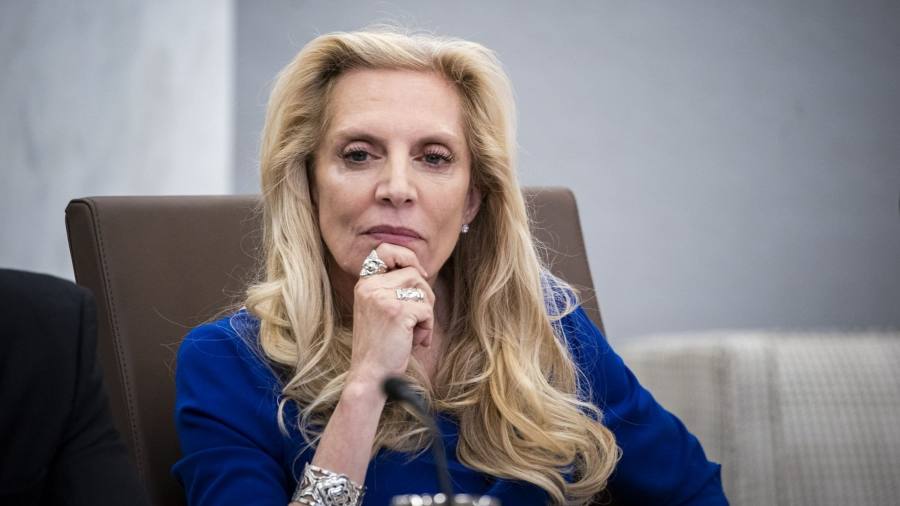The second-in-command on the Federal Reserve mentioned the US central financial institution was listening to tumult in international markets attributable to financial coverage tightening, however insisted charges should nonetheless preserve rising to fight inflation.
Lael Brainard, Fed vice-chair, acknowledged price rises the world over — a motion largely led by the Fed — would have an effect on extremely indebted rising markets, with quickly rising charges doubtlessly inflicting instability.
“As financial coverage tightens globally to fight excessive inflation, you will need to contemplate how cross-border spillovers and spillbacks would possibly work together with monetary vulnerabilities,” Brainard mentioned on Friday. She added that the Fed was “attentive” to such vulnerabilities, which “might be exacerbated by the arrival of further adversarial shocks”.
On the similar convention, hosted collectively by the Fed and its New York department, Agustín Carstens, common supervisor of the Financial institution for Worldwide Settlements — the umbrella physique for central banks — urged policymakers to stay with their campaigns to tighten financial coverage.
“When you’re flying an airplane, sure there is perhaps some turbulence [but] you don’t abort the course of your flight until you actually face one thing utterly surprising,” he mentioned.
The Fed is contemplating whether or not to hold out what can be its fourth consecutive 0.75 share level price rise at its subsequent coverage assembly in November. Extra typically, the spherical of rate of interest rises and bond sell-offs by central banks the world over has resulted in a surge in borrowing prices and a retreat from dangerous property resembling equities.
Rising market shares have tumbled 29 per cent in greenback phrases this 12 months, leaving them on monitor for the most important drop for the reason that international monetary disaster in 2008, based on a broad gauge by index supplier MSCI. The corporate’s index of growing financial system currencies is down 8.4 per cent this 12 months.
World monetary markets have additionally whipsawed this week because of turmoil within the UK associated to the federal government’s tax cuts and borrowing plan, in addition to broader considerations about how aggressively the Fed might want to stamp out the worst inflation downside in 4 a long time.
Requested concerning the fallout from the UK this week, Carstens mentioned fiscal and financial coverage wanted to be co-ordinated and have some “congruency”.
On the identical panel, Claudia Buch, vice-president of Germany’s Bundesbank, mentioned the state of affairs additionally underscored the necessity for “surveillance of your entire monetary sector” to determine potential dangers.
Cartstens mentioned: “We have to develop the self-discipline to behave in a extra forceful method after we are in peace occasions.”
A chief concern for policymakers is the implication of quickly rising rates of interest on extremely indebted nations and corporations.
The IMF and different multilateral organisations have repeatedly warned concerning the acute dangers confronting rising and growing economies, lots of that are saddled with giant shares of debt, whose servicing prices have ballooned as international rates of interest have risen.
In her remarks, Brainard mentioned fears about debt sustainability may propel “deleveraging dynamics”, such because the sell-off of property in nations with excessive sovereign or company debt ranges.
However she underscored the Fed’s dedication to “avoiding pulling again prematurely” from increased rates of interest.
In August, the Fed’s most popular inflation gauge — the core private consumption expenditures worth index — elevated 0.6 per cent and is now working at an annual tempo of 4.9 per cent. This compares with its 2 per cent inflation goal.
Brainard warned the chance of further inflationary shocks “can’t be dominated out” and emphasised that the Fed met often with its counterparts the world over to “consider cross-border spillovers and monetary vulnerabilities in our respective forecasts, threat eventualities and coverage deliberation”.
The Fed vice-chair reiterated that “in some unspecified time in the future” it might want to think about if its financial tightening went too far. She argued the consequences of the coverage would take time to filter by the financial system and that uncertainty about how far charges wanted to rise was excessive.
Brainard highlighted the affect of tighter US financial coverage on demand for international merchandise, which signifies that these nations’ economies are reined in not simply by rate of interest rises at residence but in addition by decreased US urge for food for his or her items.
“The identical is true in reverse: tightening in giant jurisdictions overseas amplifies US tightening by damping international demand for US merchandise,” she added.

